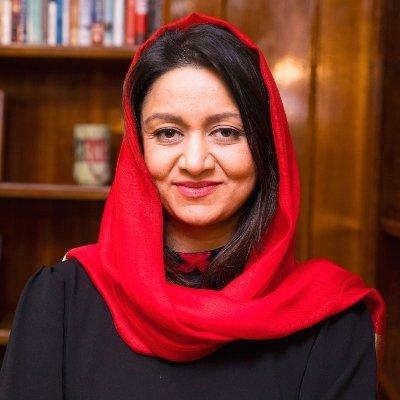CW: This article references violence in Afghanistan. Please refer to the end of the article for on- and off-campus resources.
“A new Afghanistan is still to come,” a hopeful Roya Rahmani said during a talk with Georgetown University students and faculty Thursday morning.
Despite a tide of bleak news flowing out of the country in recent months following a hasty U.S. withdrawal and the Taliban’s takeover, Rahmani, Afghanistan’s ambassador to the United States until July 2021, urged the U.S. government and public to fight to preserve the progress the country has made over the past two decades.

“I feel that now, we need to continue to work, to do groundwork for that change to come with all the people we have invested over time in, whether they are inside or outside of Afghanistan,” Rahmani said.
Rahmani was Afghanistan’s first female ambassador to the United States. Appointed to the role in December 2018, Rahmani represented a generation of educated and globally minded Afghan leaders ushered into positions of power following the fall of the Taliban regime in 2001. Before being sent to Washington, D.C., Rahmani served as the ambassador to Indonesia and the Association of Southeast Asian Nations.
The Sept. 9 event, hosted by the Georgetown Institute for Women, Peace and Security, took place two days after the Taliban officially established a new government, replacing the U.S.-backed regime it had toppled less than a month earlier. The event also fell two days before the 20th anniversary of the 9/11 attacks that provoked the U.S. invasion of Afghanistan in 2001.
The decision to withdraw U.S. troops from Afghanistan was hotly debated. Proponents of the withdrawal insisted the United States’ longest war — one that had cost the lives of 2,352 U.S. service members and trillions of dollars — had to draw to a close.
Critics of the withdrawal argued the United States’ presence in the country in recent years was limited, yet sustainable — enough to prop up Afghanistan’s fragile regime and military. Pulling out suddenly, they warned, would enable a Taliban resurgence, leaving the country’s government on the brink of collapse and endangering women and non-Pashtun minorities.
Rahmani had critiqued the swiftness of the U.S. withdrawal in past interviews. During the event, Rahmani insisted the United States must not abandon the Afghan civil society and those vulnerable Afghans it had promised to empower.
“The first practical thing that needs to happen is to ensure that connectivity is not lost. The minute that the cameras are turned away, the minute that women cannot get on the internet, the minute that there is no electricity and mobility, then you are making this black hole,” Rahmani said.
Without a foreign presence in the country, maintaining communication with and interest in Afghanistan is still important for the world, specifically the media and international leaders, according to Rahmani.
“Civil society will remain vibrant so long as they have a way to communicate and be supported,” Rahmani said. “The biggest plea I would have to everyone is to not abandon Afghanistan. You all can do what you can with your devices in your fingertips or by the contributions that you are making to refugees or advocating for those who are remaining behind.”
Over recent weeks, U.S. government agencies and nonprofits have organized frantic rescue efforts in Afghanistan to evacuate American nationals and Afghans who provided assistance to the United States during the country’s occupation. Charitable organizations across the country have also mobilized to resettle and provide aid to refugees. Georgetown pledged to support vulnerable Afghan academics and civil society members through its Scholars at Risk network, and students are working to collect necessary supplies and raise funds for refugees.
The international community, however, cannot ignore the Afghans who remain in the country, Rahmani said.
“It is basically looked at as if everything we did is rolled up — the attention or the achievements moving forward would be how many people we evacuate and that’s it, while not so much attention is given to the millions of people that will remain,” Rahmani said. “With that, you should also not forget about the progress that we have all made together in 20 years, which was absolutely massive.”
Despite a tumultuous few months, Rahmani is optimistic Afghanistan can still undergo positive change, she said.
“When you have the desire to change, there is always hope. In these gloomy dark days, I am still optimistic. I know that this is not going to be forever. I know there will be a change, and we must prepare for it.”















